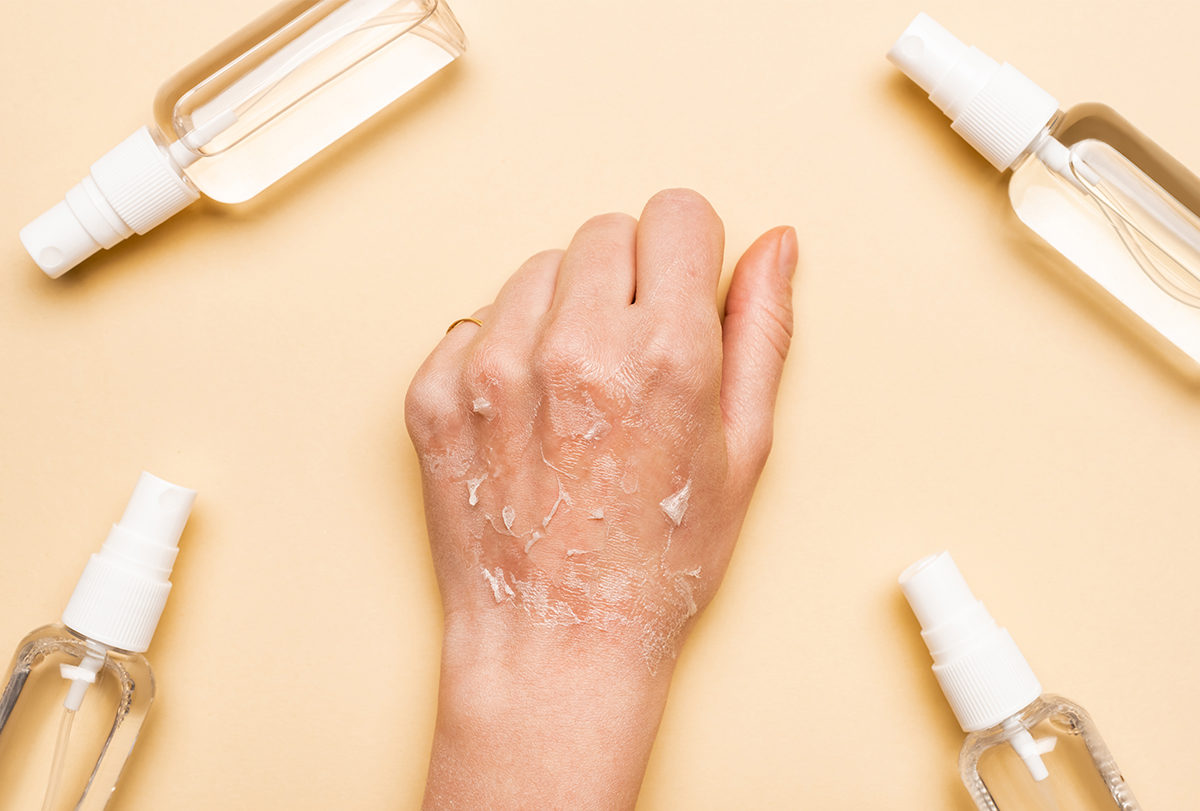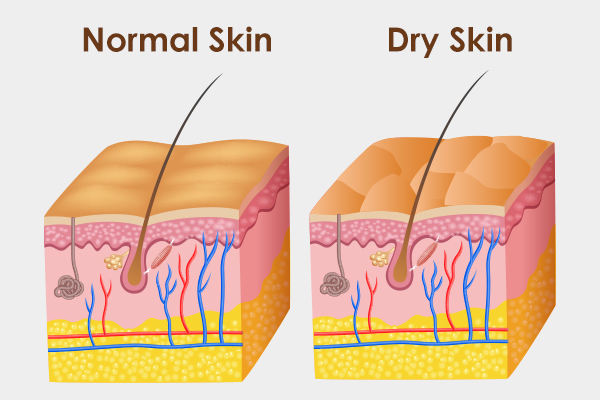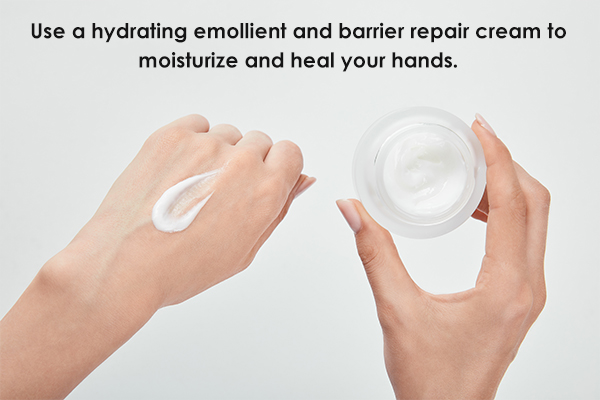In this article:
The hands are used to perform many daily tasks, making them one of the most overused parts of the body. Right from picking up things to writing, cooking, cleaning, and a million other essential activities, your hands bear the brunt.

Hence, it’s natural that they undergo a lot of wear and tear on a regular basis and have to be specially cared for to reverse this damage. It’s normal for your skin to get drier as you age. However, some people develop this problem early on or to a severe degree.
Dry hands are caused by a variety of extrinsic and intrinsic factors. While mild dryness can be managed through simple self-care methods, severe cases involving redness, peeling, and cracking of the skin warrant medical attention.
How the Hands Turn Dry

The skin comprises multiple layers, each with its own specific role. The topmost layer of the skin, known as the epidermis, serves as the body’s point of contact with the physical world and a barrier against external irritants.
Thus, this superficial skin is bound to suffer a lot of impairment daily, but it is more than capable of repairing itself. It does so by shedding the dead and damaged skin cells and replacing them with new ones.
Water plays an important role in facilitating this skin regeneration process. The dead epidermal cells are interlinked with bridge-like connections that need to be broken to loosen the cells.
Water performs this important task of disintegrating the bond between these cells so that they are easier to shed. But if your skin becomes dry or dehydrated, the bond between the cells remains intact due to the lack of water, leading to their buildup over time, which takes the form of dry, rough, and flaky skin. (1)(2)
Possible Causes of Dry and Rough Hands
A variety of factors can strip the moisture from your hands and render them increasingly hard, rough, and dry. Depending on the nature of these causative factors, they are grouped into the following categories:
1. Medical causes
Dry and rough hands can be symptomatic of the following medical conditions:
2. Environmental causes
Environmental factors that can make your hands dry include:
- Sun exposure (9)
- Exposure to allergens
- Chemical exposure
- Cold and dry climatic conditions
3. Lifestyle-related causes
Common lifestyle-related causes of dry and rough hands include:
- Indoor heating
- Frequent hand washing
- Harsh soaps and cosmetics containing synthetic compounds for fragrance (10)
- Prolonged hot showers
- No use of moisturizers
- Garments
4. Occupational causes
Occupational causes for dry and rough hands include:
- Working in the healthcare field, such as doctors and nurses
- Jobs involving gloves usage or chemical contacts
Symptoms That May Accompany Hand Dryness
If your hands become dry and rough due to some underlying condition, they are most likely to be accompanied by the following symptoms:
- Skin cracks or fissures
- Peeling, scaling, or flaking of the skin
- Itching
- Discoloration
- Redness
- Swelling and pain
Medical Treatment for Dry and Rough Hands

The medical treatment for dry and rough hands depends upon the underlying cause. So, you need a clear diagnosis to zero in on the best treatment plan.
- The starting point of healing is to avoid any product or activity that is suspected to cause hand dryness, whether it be harsh detergents, soaps, repeated hand washing, and other such contributing factors.
- The doctor will also recommend a hydrating emollient and barrier repair cream to moisturize and heal your hands.
- Hand dryness triggered by underlying inflammation is usually accompanied by a great deal of itching and redness. In such a case, the doctor will include a mild cortisone cream in your treatment plan to curb the inflammation and ease the discomfort. If this initial topical treatment fails to provide relief, the doctor will either increase your dosage or prescribe steroid pills. (11)
- If your hands become dry and itchy in response to an allergy, the doctor will prescribe antihistamine pills.
- Dry skin often develops cracks that can get easily infected if not cared for properly. Visit your doctor at the slightest sign of an infection, who will most probably prescribe an antibiotic ointment for your hands.
- If your hand dryness is the result of a serious long-term medical condition, the doctor may recommend a combination of different interventions to repair your hands. For instance, dermatitis is a chronic condition that is managed through prescription topical medications, light therapy, immunosuppressants, and biologic drugs.
- The FDA approved a topical drug called crisaborole in 2016 for the treatment of mild to moderate eczema in anyone above the age of 2 years. (12) It introduced a new drug called dupilumab the next year to address severe eczema in anyone 18 years of age or older. Dupilumab has to be injected under the skin twice a month. (13)
Note: Unlike hand moisturizers that can be generously applied all over the hands multiple times a day, you have to be far more judicious in the case of steroids, which can cause skin thinning and other long-term side effects if used excessively.
When using cortisone products, always stick to the doctor’s instructions regarding the amount, frequency, and area of application. Steroid creams should not be used for more than 1–2 weeks at a stretch. If you are using a cortisone cream along with a moisturizer, first apply the cortisone product, then the moisturizer.
Diagnosing the Cause Behind Dry and Rough Hands

Diagnosing the cause of your hand dryness involves the following steps:
- Visually examining your skin
- Inquiring about your medical history, symptoms, daily habits, and aggravating factors, among other relevant things
- Additional tests if an underlying health problem is suspected, such as:
- Prick test
- Tests to detect food allergies
- Skin biopsy
- Skin scrapings for lab examination to rule out fungal infections
- Patch tests to rule out contact dermatitis
Risk Factors for Dry Hands
The following factors can make you more susceptible to hand dryness:
- Increasing age
- Genetics
- Allergies
- Occupation
- Cold and dry climate
- Swimming in chlorinated pools
Possible Complications of Untreated Dry Hands
Severe or untreated hand dryness can give rise to the following complications:
- Bleeding
- Infections
- Blistering
- Atopic dermatitis
- Allergic dermatitis
- Crusts
- Pus
When to See a Doctor
You should seek medical attention for your dry hands if any of the following symptoms are present:
- Bleeding
- Discoloration
- Swelling
- Drainage from open wounds
- Extreme redness
- Extreme dryness and itching that disturbs your sleep
Final Word
People generally limit their skin care efforts to their face and ignore their hands, which are perhaps the most overused part of the body. The continuous skin damage that your hands face regularly can leave them rough, hard, and dry.
Needless to say, people whose jobs entail carrying heavy loads such as laborers, repeated hand washing, handling water, or handling harsh substances will most likely have dry, rough hands. But even housewives are prone to developing dry and rough hands due to daily chores such as washing dishes and clothes. Most cases of hand dryness are mild and subside gradually, with or without treatment.
But if the problem persists for more than a couple of weeks or is severe enough to cause stinging discomfort that keeps you from performing your tasks, visit a doctor for the proper treatment.

- Was this article helpful?
- YES, THANKS!NOT REALLY


